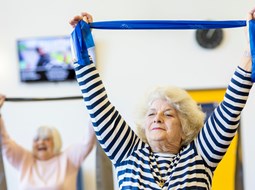Facing barriers to getting active?
Overcoming the psychological obstacles to exercising can sometimes be more challenging than actually doing the activity itself. Here we have some suggestions to help you overcome the different barriers.
Even the smallest changes can add up to significant gains so try not to worry about doing too much too soon if it feels unachievable.
Here, we suggest practical ways to gradually build exercise and activity into your routine.
These days, there are activities to suit everyone from seated exercises to online salsa or belly-dancing, to outdoor hiking or swimming.
Whilst all forms of exercise are good, those that work out your cardiovascular system to get the heart pumping are considered to have the best health benefits, such as running or swimming.
These types of activities, that leave you a bit out of breath and somewhat hot and sweaty, can drastically reduce your risk of health problems such as heart disease, stroke and obesity. In addition, they can leave you feeling really good owing to the rush of endorphins they bring.
If time is especially limited, try not to be too ambitious and make small changes gradually. Try to think of tweaking your routine.
If you have not exercised for a long time and have any concerns about health conditions or physical difficulties, it is advisable to speak to your GP before making any sudden changes in terms of activity.
If your caring responsibilities are all-consuming, you could request a carer's assessment or seek support from your local council (or Trust in Northern Ireland) to arrange respite cover so that you can find time to look after your own needs.
It’s easy to talk yourself out of exercising before you’ve even begun. Ironically often the best time to go is when you are tired and feel like watching TV.
It’s hard to foresee how you will feel, and initially it may be hard but over time, the boost in endorphins will give you a new lease of life afterwards. The more you feel this natural rush, the more you will want to repeat the experience.
After you have completed an activity, even if it’s just 10-15 minutes, you will feel a sense of achievement and satisfaction even if other aspects of your day have not gone your way. Exercise can boost not only your mood, but also your confidence and self-esteem.
Joining a club can be a relatively cheap alternative to a gym membership and a great social outlet or way to meet new people. Our research shows that many people don’t see this as a key motivation initially, but then find they make new social connections and overcome that sense of isolation caring can bring.
Alternatively, there are many high quality exercise programmes you can follow online. If this isn’t the right option or you need to get out of the house but still need a bit of flexibility, you could investigate ‘pay as you go’ options provided by local community groups or your leisure centre.
Of course, getting more active needn’t be costly. For example, you could go for walks, a run or try out one of our recorded activity sessions.
Visit our activity hub and tips page for ideas on how to get started. Or to find out what’s available locally, get in touch with your local council or trust. You also check out the activities of the local leisure centre or community clubs in your area.
It is often best to start slowly and gradually build up your fitness levels. Do check with your GP before undertaking a new activity regime if you have a long-term condition, are recovering from illness or are new to exercising.
Choose something you really enjoy and find stimulating as that will really help you to stick with it, especially if you can chart your progress over time. You may also be able to involve the person or those you care for, depending on their interests and situation.
Sometimes it takes a while to find out what works for you so you could try out a variety of taster sessions for different sports or activities until you find something that feels right. Sticking to a routine, for example by joining a club or course, can also help provide that much needed motivation by adding a social dimension. Our 10 wellbeing tips could be a helpful starting point.
Finding practical support
Finding someone to help whilst you take time out to be active and look after yourself can be challenging.
You could try making an arrangement with a family member, friend or trusted neighbour to see if they could look after the person you care for for an hour or two.
See what services are provided by your local carers’ organisation or council. You can search using our local directory. You could also request a carer’s assessment and explain that you need support to allow you the time to exercise, rest and take care of yourself.
There are also activities you could try that might be enjoyable to do together from seated martial arts to dance. Our Share and Learn sessions are provided online via Zoom and are free. They cover a range of activities. You can browse previously recorded ones here, such as seated martial arts and Pilates.
If it’s practically impossible to take any time out, try to make small changes to increase your activity levels during your daily routine such as using the stairs smartly by repeating two up then two down steps.
Or if you're too exhausted and caring around the clock, it's important to arrange a carer's assessment, making it clear how your own needs and health are at risk through not getting the opportunity to have any you time. See our guidance on how to arrange one.
Try not to let guilt get in the way – and note that even small adjustments can go a long way to improving your sense of wellbeing.

